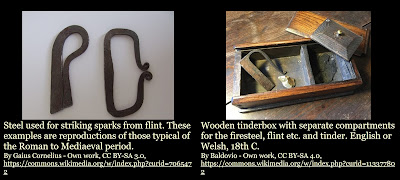Fire │ Ignis
[1] The fire gloweth,
burneth and consumeth to ashes.│ Ignis ārdet, ūrit,
cremat.
[2] A spark of
it struck out of a flint (or firestone), by means of
a steel, │ Scintilla ejus ēlīsa ē silice,
(pyrītē) ope chalybis,
[3] and taken by tynder
in a tynder-box, │ et excepta ā fōmite in suscitābulō,
[4] lighteth a match, and after that a candle, or stick,
│ accendit sulphurātum, et inde candēlam,
vel lignum,
[5] and causeth a flame,
or blaze, │ et excitat flammam, vel incendium,
[6] which catcheth
hold of the houses [buildings]. │ quod corripit ædificia.
References to
fire, burning etc. – with a wide range of vocabulary – are not uncommon in CL
literature, and this passage from Comenius presents a large number of them;
note that many of the words (as in English) can convey both literal and figurative
meanings related to emotions e.g. ultrīcis flammae │ flames
of the avenger (vengeance). Additional related vocabulary is listed.
Vocabulary
[1] Ignis
ārdet, ūrit, cremat.
[i] ignis, -is
[3/m]: fire
igneus, -a, -um:
fiery; Engl. deriv. igneous rock (formed from lava or magma)
igniō, -īre, ivī, ignītus
[4]: set on fire; Engl. deriv. ignite
[ii] ārdeō, -ēre,
ārsī, ārsus [2]: [i] burn, be on fire [ii] glow, [iii] ‘burn’ emotionally e.g.
with love
iam amōre virginālī tōtus ārdeō, novus, novus amor est, quō
pereō. (Carmina Burana) │ I’m now totally burning with first love, it’s a new,
new love from which I’m dying
- ārdēns, ardentis:
the present active participle; Engl. deriv. ardent
[iii] ūrō, -ere, ussī,
ustus [3]: [i] burn [ii] inflame e.g. with passion
haec eōs in
Etrūriā iactantēs mōlientēsque bellum domī Rōmānum ūrēbat (Livy) │ While
they were embroiled and struggling in Etruria the war in Roman houses raged
[iv] cremō, -āre,
-āvī, -ātus [1]: consume by fire [ii] burn to ashes; cremate [iii] make
a burnt offering
- cremātā urbe (Livy) │ with the city having been
reduced to ashes
[2] Scintilla
ejus ēlīsa ē silice, (pyrītē) ope chalybis,
[i] scintilla, -ae
[1/f]: spark; glimmer; Engl. deriv. a scintilla (small trace) of hope
- scintillō, -āre,
-āvī, -ātus [1]: sparkle; scintillate > scintillating
(brilliantly clever)
[ii] silex,
silicis [3 m/f]: flint; stone, pebble
[iii] pȳrītēs,
-ae [m] = Anc. Gk πυρίτης [pŭrī́tēs]; described as a ‘firestone’, but meaning
iron pyrites used for starting a fire
[iv] chalybs,
chalybis [3/m]: iron; steel; here Comenius uses the word to refer to a steel piece
used for striking sparks from flint [see image]
Fluit aes rīvīs aurīque metallum, vulnificusque chalybs vastā
fornāce liquēscit. (Virgil)│ Bronze
and golden ore flowed in streams, and steel, that deals wounds, melted
in a vast furnace.
The more common
word for ‘iron’ is ferrum, -ī [2/n]
[3] et excepta
ā fōmite in suscitābulō
[i] fōmes, fōmitis
[3/m]: tinder; kindling
[ii] The
‘tynder-box’: I have the feeling that Comenius was faced with the same
challenge in 1658 as Latin speakers are now i.e. how do you express in Latin a
contemporary and, indeed, everyday object which, before this period in history,
never existed or was never referred to:
suscitābulum, -ī
[2/n]: the original meaning of this word (which is very rare; only one
attestation listed) is a ‘stimulant’ or ‘excitement’ from suscitō, -āre,
-āvī, -ātus [1]: stir up; arouse; produce; rekindle;
Comenius uses it to refer to the ‘tinderbox’ (as shown in the original
illustration), a container made of wood or metal [see image] in which items
needed to start a fire were stored.
Interestingly, the
word is listed in more than one source as meaning ‘clock’ or, specifically,
‘alarm clock’, which is logical given the meaning of the original verb although
how it changed from a ‘tynder-box’ to an alarm clock remains a mystery!
https://la.wikipedia.org/wiki/Suscitabulum
https://neolatinlexicon.org/latin/alarm_clock/
https://latin-dictionary.net/search/latin/suscitabulum
[4] accendit
sulphurātum, et inde candēlam, vel lignum,
[i] accendō, -ere,
accendī, accēnsus [3]: light (a fire)
[ii] sulfurātus
(sulphurātus) -a, -um: impregnated with sulphur i.e. Comenius uses it as a noun
i.e. a ‘thing covered in sulphur’; 17th century: “thin wooden sticks
coated with a flammable substance, like sulfur, and ignited by
sparks from flint and steel”
- Neo-Latin: rāmentum
sulphūrātum (match); from CL: rāmentum, -ī [2/n] (usually in
plural i.e. rāmenta: shavings); the poet Martial uses the term rāmentum
sulphurātum to refer to a ‘sulphur match’
[iii] candēla, -ae
[1/f]: candle
[iv] lignum, -ī
[2/n]: food that is gathered for a fire; firewood, as opposed to:
- matēria, -ae
[1/f]: timber; wood used for construction
[5] et excitat
flammam, vel incendium,
[i] flamma, -ae
[1/f]: flame
- inflammō, -āre,
-āvī, -ātus [1]: ignite; inflame; Engl. deriv. inflammatory; inflammation
[ii] incendium, -ī
[2/n]: fire; inferno; Fr: incendie refers to an uncontrolled fire
- incendō, -ere,
incendī, incēnsus [3]: [i] set on fire [ii] arouse, excite, inflame, incense;
Engl. deriv. incensed; incense (e.g. incense sticks burnt
in a temple); incendiary device
[6] quod
corripit ædificia.
corripiō, -ere, corripuī,
correptus [3-iō]: seize; take hold of


























